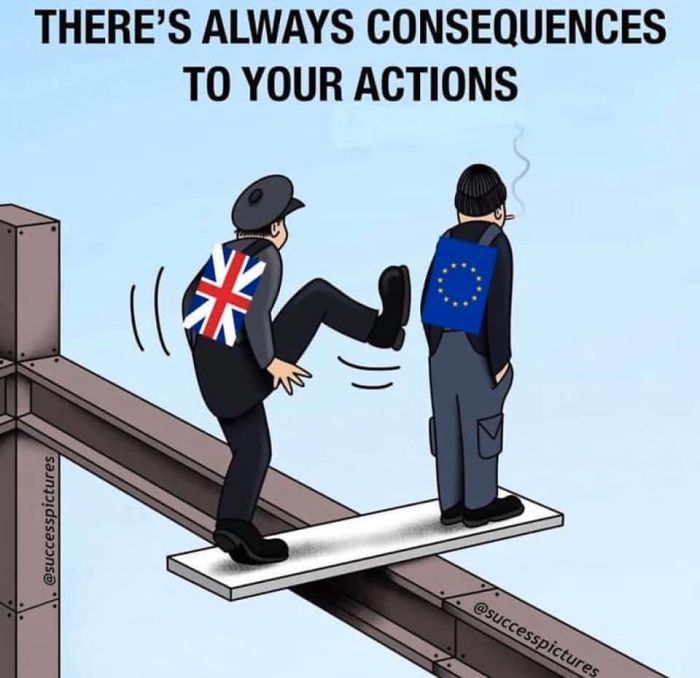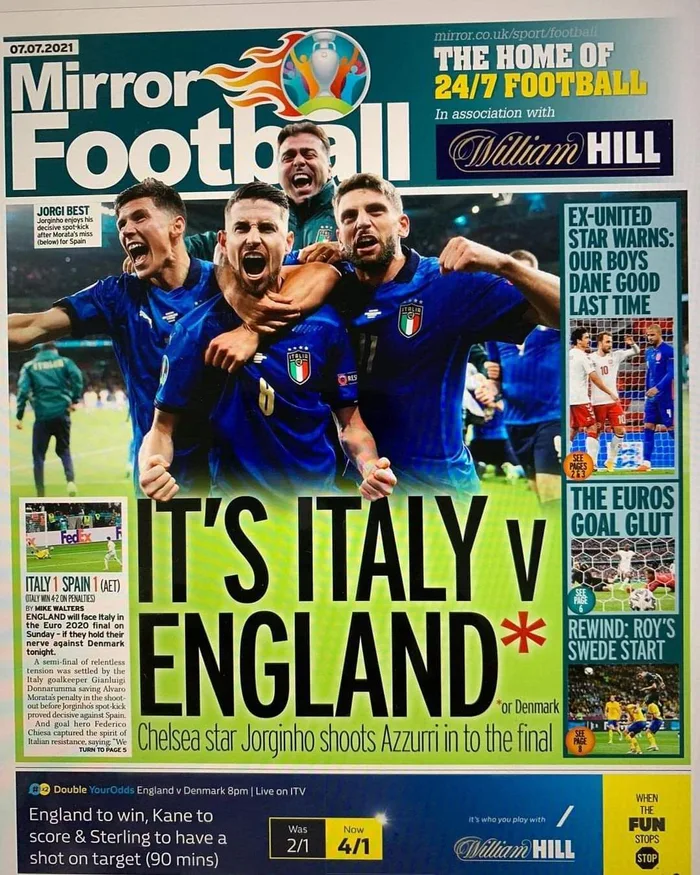Did you notice it too? The whole of Europe was praying for England to lose their EUROS 2020 final game to Italy.
If, like me, you’re not a particularly big fan of the ‘beautiful game’, you are probably delighted that the EUROS 2020 is finally over.
Don’t get me wrong, I have been known to watch, and even enjoy, a football match here and there. And like most people who remember life before constant connection, I too have enjoyed a kick about in the park. But it’s not a sport I actively choose to watch on a regular basis.
But this year, something felt different. Maybe it’s because I live in central Europe now. I’m exposed to the perspectives of those who surround me from various European nationalities. Maybe I’m more willing to look further and think deeper about life. Maybe it’s because I read the news every single day now. Maybe it’s Maybelline.
Either way, shortly before, during and after the final of this year’s competition, something became very clear to me. Europe hates England.
I wanted to find out why. I already have my own ideas about what makes my home country such an unlikeable nation. And the news stories that have emerged throughout this football competition have provided further reasonings. But I’m also keen to find out the feelings of those who actually are from mainland Europe, or who live here.
So I took to Instagram and asked my group of pals there. And boy am I glad I decided to do that. I had some of the most engaging conversations I’ve ever had on the platform.
The answers were varied. Some were as shallow as “Italy has better food” or “Germany are just butthurt they got kicked out by England”. But, as I expected, many of the reasons ran much deeper than that.
I managed to break them down into seven main themes, the first three of which are below. Here’s part one of ‘The truth about what Europe thinks of England’
1. Brexit
Of course, it’s a factor. We’re not really ignorant enough as a nation to think we could cut all ties with the EU but still be best pals, are we? Are we?

We brought this on ourselves. Well, the 52% did (I was part of the 48%, in case there was any doubt in your mind).
Those who voted ‘Leave’ had rose-tinted glasses superglued to their faces as they reminisced about a past most of them can’t remember. They were fed lies about how Britain would be Great again. A powerful, independent island nation.
However, the decision to leave the EU happened so fast, was so ill-informed and unthought-through that it surely begs the question of precisely what newly independent Britain these ‘Leavers’ were envisaging. There was never any specificity around what was going to be done to Britain Great again. There was just a lot of posh shouting about “taking our country back” and stopping migrants stealing jobs.
The general feeling among Europeans is that we’ve made our bed and now we must lie in it. Although Brexit was a highly political move, there’s already evidence of the impact it has had and will continue to have on culture.
Touring as a musician is about to become even more difficult and expensive than before. It’s recently been announced that the EU is preparing to significantly reduce the amount of British TV and film shown post-Brexit.
Sport is a part of culture. So this hostility towards the England team and fans during this competition should have come as no surprise to any English citizen.
Bernd Riegart from Deutsche Welle described Brexit as the British “needlessly embarking on a perilous journey”.
Bert Wagendorp from the Dutch newspaper De Volkskrant was ecstatic to see us go: “for 47 years the British have done their utmost to sabotage, slow down, dilute and transform Europe into a market for Marmite and Pringles, replacing their lost colonial empire.”
Europe thinks of England not as an enemy, but not as a friendly neighbour either. Why would they now?
Here are some of the feelings I gathered from Instagram:
“Brexit was not easy to accept for European people and since the name of this competition is EUROPEAN, it wasn’t nice to let England win”
“Brexit – many people have seen that the UK doesn’t want to be European”
“Brexit, 100%”
We are but an island now.
2. Britain’s Identity Crisis
Brexit’s first cousin.
Kick-started by the referendum in 2016, Britain has since spiralled into a vortex of nostalgia (for a country nobody under the age of fifty-five has any real political or social memory of) and the idea that we can “take our country back”.
I will remind you here that the British Empire invaded 90% of the world’s countries, eventually settling to rule in 25% of those territories. They also held command of the sea for a significant period of history. The British Empire themselves invited hundreds of thousands of people from the British territories to fill the UK labour gap left after the war.
Who exactly do they want their country back from?
Let’s not forget the fact that Britain has refused to acknowledge, let alone try to put right, the damage they caused during their tyrannous reign over the world. They moved straight from the “imperial motherland passionately convinced of its own racial superiority to one with the moral integrity of having defeated Nazism” (Afua Hirsch, ‘Why Britishness, as an identity, is in crisis’).
We’ve become a country that wants everyone to remember when we were a tiny nation with a big ass empire, instead of having a more global, progressive outlook. The problem is that Scotland does not feel the same way. They’re very much fighting for independence from the UK. An independence movement is gaining traction in Wales as well. And England is also a divided country.

James Melville for the Byline Times explains that “British politics is now riddled with a deeply provincial and introverted mindset at a time when Britain should be at ease with playing a significant role towards outward-looking global expressionism. Brexit has become an identity conflict in Britain. It is a binary choice (…) It is Danny Boyle’s London Olympics Opening Ceremony versus the Last Night of the Proms. It is Remainers versus Brexiters.”
Without a coherent national identity, which it is currently lacking, England and Britain “simply does not have a strong enough cultural imaginary to meaningfully define itself in the globalised, precarious 21st Century” (Alex Niven for The Guardian).
The Instagram thoughts:
“The UK is going through a massive identity crisis.“
“For a lot of us, it’s hard to look in the mirror and see the flaws of our own country, especially if we’ve never lived outside it”
I was hoping England would lose partially because of the colonial history
3. English Arrogance
I felt it as a child growing up in England. I felt it as an adult living in England. And I feel it even more now as an English woman living in central Europe. We’re arrogant.
There’s a general feeling that, as a nation, we’re superior to others. I think this comes down to something mentioned in the previous point. We’re still stuck under this colonial umbrella because we’ve never confronted the past. The small amount of education I received on the British Empire was about how much of a positive impact we had on the world. About how we created jobs for people. I didn’t study history further than high school, so I was in my mid-twenties when I started to understand the true scale of the chaos.
Even I was arrogant when I first moved to Germany. Arrogant that I wouldn’t have any trouble finding a job because I’m English and everyone wants native English speakers, don’t they? I am pleased to confirm that after the 100th job rejection, it kicked in that simply being English or British was not enough to survive here.
It’s a societal thing instilled into us from birth. We’re raised to be very proud of being a tiny nation that once had a huge empire. Psychotherapist Andy Cottom thinks that a lot of English pride actually stems from shame about not being who we used to be.
Europe thinks of England as an arrogant nation most recently because we essentially declared our EUROS victory to the world before the game even took place.
My Nan was shouted at in her local supermarket because she openly admitted she didn’t think England could go all the way. She was told she wasn’t patriotic and she didn’t care about her country. All because she thought a football team would lose a match.

This isn’t to say that all Europeans HATE everything about England or Britain. “We don’t want to be unfair,” writes Jan Fleischhauer for Der Spiegel. “We have the British to thank for afternoon tea, Monty Python and the Beatles, which is more than many countries have managed to produce in their history.”
This also isn’t to say that I am not, at times, proud of my home country. Please don’t get right-wing nationalism confused with patriotism here. They’re very different. I can still be proud of my country and patriotic about it but also have the guts to take a look in the mirror and see its many flaws reflected back at me. This is how positive change and growth happens.
But I do think we Brits rely on the positive cultural impacts we’ve had a little too much. We have rarely reciprocated the love other countries have given to our popular culture. It’s only recently that foreign music and television have started to chart in Britain. I have a sneaking suspicion that’s more to do with the global accessibility to media that we have now, rather than anything else.
What Instagram says:
“Always too cocky and think they are going to win according to my European colleagues!”
“Too arrogant, they have declared their victory before playing.”
“mainly the arrogance of some of the British over the past 50 years while we were in the EU.”
This is part one of a two-part essay on this subject. Part two will be published this Sunday so stay tuned!
If you like this post, you might also enjoy these other Brexit related posts:

Pingback: The truth about what Europe thinks of England: revealing how Europeans really feel about us (part two)
Pingback: 5 things I love about England and 5 things I don't.